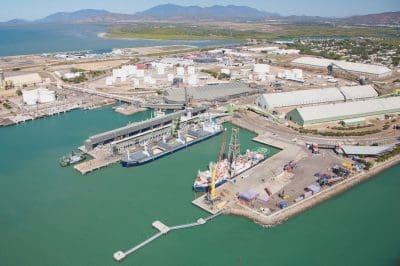LIVESTOCK export industry leaders say they are working with ports and federal and State Governments to find ways to ensure the trade can continue to operate through the new restrictions introduced to curb the spread of coronavirus.
The industry has written to federal agriculture minister David Littleproud this week highlighting various ways new coronavirus restrictions are disrupting the trade’s abillity to operate.
One issue in particular surrounds newly announced restrictions at Queensland ports requiring 14 days to have elapsed since a vessel has left an international port before it will be allowed to berth in Queensland.
This requirement is causing unnecessary costs and delays, exporters say, despite appropriate measures already being in place to manage crew movements.
“Considering a voyage from Indonesia to Australia can take as little as four days, these requirements will add an extra 10 days to some voyages,” Australian Livestock Exporters Council chair David Galvin wrote to the minister.
He said the measures would severely impact the flow of goods in and out of Australia and add significant and unnecessary cost at a time of economic downturn.
ALEC CEO Mark Harvey-Sutton said the industry is currently working constructively with ports to navigate the current situation and to ensure biosecurity and animal welfare is upheld while giving vessels timely and required access.
Discussions between industry representatives and Government and port authorities have been continuing in an attempt to find an agreeable solution.
Mr Galvin also drew the Minister’s attention to the long delays now involved in returning accredited stockmen and women and veterinarians back to Australia after a voyage, due to flight restrictions, rules preventing ship employees from disembarking in some destination countries and 14 day self-isolation requirements.
Some accredited personnel were also concerned about entering closed-loop quarantine systems without additional recompense, one of various factors contributing to a shortage of accredited staff.
Exporters say they are now looking at ways to instigate emergency accreditation measures in order to have enough appropriately qualified personnel to allow shipments to proceed.
Mr Harvey-Sutton said that to assist with workforce supply, LiveCorp has now made arrangements for an alternative pathway to stockperson accreditation, where a person can demonstrate appropriate skills and experience in order to gain accreditation to support the regulatory requirements and animal welfare standards.
Export trading partners seeking assurances Australia can supply
In his letter to the Minister Mr Galvin said many of Australia’s export trading partners are growing increasingly concerned about food security, and are seeking assurances that Australian exporters can continue to deliver livestock, particularly as the supply of chilled and frozen meat products becomes constrained by global air-freight limitations.
The industry has asked the Federal Government to temporarily waive export fees and charges for at least six months, saying the measure is needed to stimulate the movement of goods and to free up funds that are needed to address mounting additional costs.
Mr Galvin’s letter described the blanket 14-day lapse in time between ports as over-simplistic and a potential non-tariff barrier, when appropriate management strategies could be applied at individual ports.
Mr Galvin said it was of “paramount importance” that Australia sends a strong signal its trading partners that it remains a trusted and reliable supplier of livestock capable of satisfying their food security needs even in time of upheaval, and to ensure customers do not seek livestock from Australia’s competitors.
Mr Harvey Sutton-said the industry remains committed to the highest standard of animal welfare, ensuring all staff and crew are well cared for and will continue to work with the broader red meat industry, government and its global partners to continue to safely provide protein and food security.
“Our global markets are relying on the live export industry to support their food supply chains and the importance of live export is increasing given the reductions in other forms of transportation. We have a responsibility to continue to support our regional neighbours and their food production systems at this critical time,” Mr Harvey-Sutton said.
The Queensland Livestock Exporters Association told Beef Central there are practices exporters and carriers can implement to improve management of potential risk at ports, making the 14-day rule unnecessary.
There is also some urgency to these issues being resolved quickly, because the large northern cattle industry is on the cusp of starting annual dry season mustering rounds at the start of April, a time of year when market access is of significant importance to allow drying paddocks to be destocked.




Direct sales of livestock to importing countries will reduce the effect of Covid-19 impacting on the many processes required to supply boxed beef. Food security for importing countries is paramount during this challenging time.